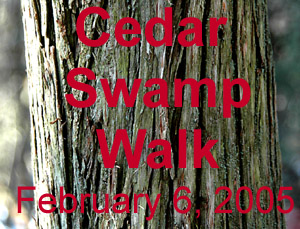  |
|
PARTNERS | HEALTHY CITY | HOW HEALTHY | VISION | SUMMIT | PRIORITIES | FUNCTIONS | CITY OF FALL RIVER |
|
Prized for its lightweight,
decay-resistant wood, the Atlantic White Cedar was once a common tree in our
region but is now quite rare.
The Trustees of Reservations Property Manager Michael
Labossiere
led a
group on a heart-healthy walk through the
Copicut Woods to one of the few remaining stands of these rare trees.
The February 6, 2005 walk was one in a series of
walks that the Trustees offer free of charge. Copicut Woods is part of the Southeastern
Massachusetts Bioreserve, an area of preserved forest large enough to
sustain the native biodiversity of this region, from the dominant white
pine-oak forest to these rare Atlantic white cedar swamps. |
||
|
|
|
|
|
|
 |
|
|
|
|
|
|
(Top row, left) The group begins the roughly one-mile hike at a location near the north side of the Copicut Reservoir, one of the two bodies of water that supply the City of Fall River. Stopping along the way, Mike Labossiere discusses how the forest is managed to preserve it as a natural resource for both animals and man. (Center) The group pauses at a natural spring that feeds the cedar swamp that occupies several hundred acres within the forest. (Bottom row) The Atlantic White Cedar (Chamaecyparis thyoides) grows in fresh water swamps and bogs. The root system is shallow and sensitive to change. Any change in the level of water could completely destroy the Atlantic White Cedar trees and different, more common trees will invade the area. |
||